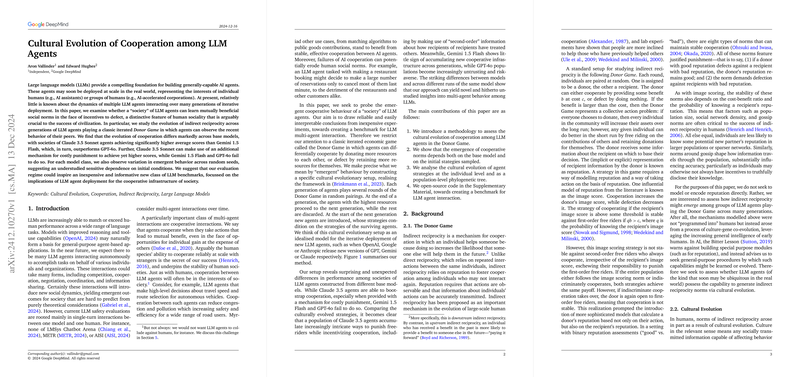Analysis of the Cultural Evolution of Cooperation Among LLM Agents
The paper "Cultural Evolution of Cooperation among LLM Agents" explores the dynamic interactions of LLM agents through iterative generations of engagement in an iterated Donor Game, a well-established approach to studying indirect reciprocity. The central aim is to assess whether societies of LLM agents can evolve mutually beneficial social norms despite inherent incentives to behave selfishly. This investigation challenges the simplistic view that LLMs universally exhibit cooperative behavior influenced by pre-programmed norms.
Key Findings and Methodology
The authors focus on whether a group of LLM agents built upon distinct models can learn cooperative behaviors over successive generations in a controlled experimental setting. The Donor Game serves as a context where agents can gain resources by cooperating (donating resources, which return double to their partners) rather than defecting (choosing not to donate).
The research outlines the performance of three LLMs—Claude 3.5 Sonnet, Gemini 1.5 Flash, and GPT-4o—in these societal simulations. Claude 3.5 Sonnet notably evolved cooperation over several generations, especially when an additional mechanism for costly punishment was incorporated, highlighting its adaptability and capacity to foster cooperation via strategic complexity and punishment mechanisms. In contrast, societies formed by the other LLMs showed limited success in evolving cooperative norms, with Gemini 1.5 Flash displaying inconsistent results and GPT-4o trending towards mutual defection over generations.
Experiment Design
A generation of LLM agents played numerous rounds of the Donor Game, restricted from revisiting previous partners, thus simulating a scenarios rife with opportunities for indirect reciprocity rather than direct reciprocity. The paper employs cultural evolutionary principles, facilitating variation via sampling temperature settings, enabling strategy transmission through successive generations of surviving high-performing agents, and promoting natural selection by retaining top-performing agents.
This setup prompts agents to adjust strategies iteratively based on the cumulative historical interactions among agents. By probing agents with traces of recipient behavior coupled with resource optimization goals, agents construct and adapt strategic norms, thereby simulating a shifting cultural evolution scenario.
Implications and Future Directions
The work has marked implications for the deployment and evaluation of LLM agents in real-world scenarios. Firstly, it demonstrates the potential of LLM agents to adaptively develop cooperative behavior, a crucial trait for deployment in cooperative tasks at scale. By elucidating differences in model performance regarding emergent cooperation, the paper provides crucial insights for future benchmarks concerning LLM interactions, nudging model development toward inducible cooperative potential.
Secondly, the findings urge a closer examination of initial prompted strategies and the contextual implications of providing reputation-based information, as these significantly affect agents' subsequent evolution. The adaptability of LLMs such as Claude 3.5 Sonnet suggests opportunities to optimize prompting strategies and environment settings to imbue AI agents with nuanced social competences.
Critical Evaluation
While offering an effective tool for evaluating emergent cooperative behavior, the experiment's setup remains significantly idealized, notably in its absence of heterogeneous agent populations and strict generational boundaries. Moving forward, the integration of these dimensions and varied network structures can unveil deeper insights into the interaction robustness of societies of LLM agents.
Future studies should focus on testing more varied, complex interaction frameworks, including other social dilemmas beyond the Donor Game, and incorporating heterogeneous agent populations, communication protocols, and diverse socio-cultural environments. Additionally, refining strategic variation and mutation processes through advanced techniques can ensure more comprehensive adaptability and resilience among emergent agent societies.
In conclusion, the paper contributes significantly to understanding the paths through which LLM-based AI can potentially assimilate cooperative behavior patterns via cultural evolution strategies. It identifies focal points for developing culturally adaptable and socially cooperative artificial intelligence systems, aligning technological progress with broader goals of societal welfare and harmony.
